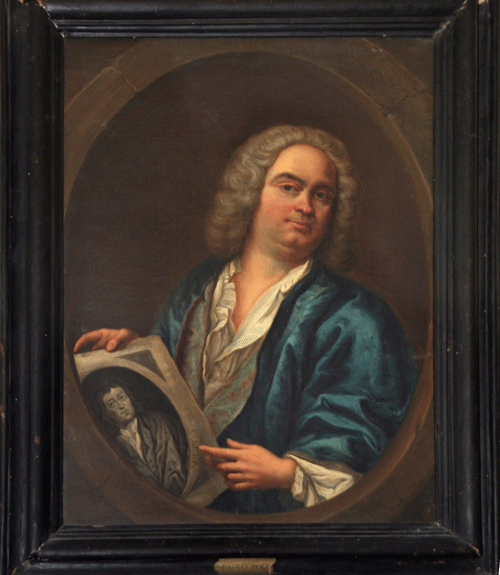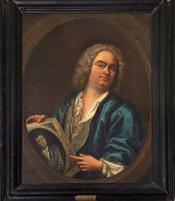Not that he seemed much
interested in that particular distinction. In 1749, on writing to his colleague
Carlo Innocenzo Frugoni, a successful court poet in Parma, Rolli affected to
consider his London librettos as mere “dramatic skeletons”
contrived to meet the audience’s poor fluency in Italian, although he
boasted that they brought him “200 scudi each” (about 150 pounds),
plus the sale of wordbooks for his benefit — with the clear implication
that he could further produce better work in Italy for less money. However,
Frugoni lauded Rolli’s “sturdiness of frank style, strong colors of
Poetry, and freedom of veracious and wise thought”, as opposed to
Metastasio’s “sweet construction of lines both easy and
noble”.
Until a few decades ago, Rolli’s surviving reputation rested mainly on
a handful of short lyrics, notably “Solitario bosco ombroso”, a
piece that any primer of Italian literature quoted as a model of classical
perfection. In addition, his biographies emphasized his role as a cultural
mediator between Italy and Great Britain, mentioning his activity as language
teacher, editor, publisher and translator (his blank-verse translation of
Milton’s Paradise Lost was reprinted several times since 1729).
Nor did he lack social recognition in London: he taught Italian to various
members of the royal family and the peerage, befriended (among others) Sir
Isaac Newton, and was made a Fellow of the Royal Society — a title which
he proudly inscribed on the title-pages of his literary publications since
1729.
The pendulum started swinging back in the 1960s, when the rediscovery of
Handel’s operatic output fostered scholarly interest in one of his most
effective purveyors of music dramas. True, the two men did not get along
grandly. In 1719 Rolli was appointed as the Italian secretary of the Royal
Academy of Music on an annual salary of 200 pounds. He prepared most of the
librettos performed during the company’s first three seasons
(1720–2), including Handel’s Muzio Scevola and
Floridante, but he was dismissed in 1722 following a dispute with the
directors and, apparently, Handel himself.
However, during 1726-7 he revised another three librettos for Handel:
Scipione, Alessandro and Riccardo Primo. His
publication Di canzonette e di cantate libri due (London, 1727)
included three texts that Handel set to music as cantatas for solo voice and
continuo. Rolli satirized the composer’s activities during the
“Second Academy” period (1729–34), and in 1733 he became the
principal poet for the competing Opera of the Nobility. For that company he
wrote at least eight librettos until its collapse in 1737, most of them for
Porpora. Later on, he prepared a few more dramas for London, including the
remarkable libretto for Handel’s final opera Deidamia (1741) and
some works for the Middlesex Opera Company. It has been estimated that he wrote
or rewrote librettos for at least 34 opera productions in London between 1720
and his eventual departure for Italy on 12 August 1744. After settling in Todi,
where he had received a patent of nobility in 1735, he had no further
involvement in theatrical ventures.
Why just Todi? This lovely small town on the hilltops of Umbria, the
“green heart” of Italy, was the cradle of his mother’s
family. From here, Marta Arnaldi moved to Rome to become the wife of Philippe
Roleau, later Italianized into Filippo Rolli, an architect and merchant from
Burgundy. The couple had eight children. Last-born Paolo, who died unmarried,
named heir usufructuary of his fortune a certain Samuel Right a.k.a.
“Samuele Retti”, his British butler whom he quoted in his 1763
testament with marks of boundless affection and trust, even exempting him from
the duty of showing his accounts to the legal heirs: nephews Carlo and
Francesco and niece Isabella, barons Murena di Collalto.
Samuele, as Rolli stated, had served him from his early youth without a
salary. Actually, according to a family tradition that crept into the Rolli
literature since 1907, he was the poet’s natural son, which would explain
their unusual arrangement. News is that Retti’s descendants are still
living in Todi and nearby Foligno. “Until 1927” — says
Professor Manfredo Retti, a retired teacher of humanities — “they
enjoyed an enviable economic condition. Then my grandfather Gino, a bank
cashier, went bankrupt because of certain wrong speculations. Away went the
landed estates, buildings, old furniture and works of art — all
gone”.
Well, not quite. On March 28, a group of three lucky explorers —
Professor Retti, his friend Francesco Tofanetti and this writer — chanced
to spot a Rolli portrait hitherto presumed lost. In 1911, it was photographed
in black and white by the music historian Sesto Fassini and then published as
the frontispiece of his seminal essay Il melodramma italiano a Londra
(Turin, 1914). “Cavaliere Clodoveo Retti, the painting’s
owner and Gino’s paternal uncle, died childless shortly after”,
recalls Manfredo. “He may have presented it to Olinda Olivieri, a little
girl from a neighbor family who often visited him. Olinda, who passed away in
1972, reportedly sold or bequeathed it to a school”. Details are still
under investigation, but the school was found. The medieval nunnery of
Montecristo, on a hill slope facing Todi’s northern gate, now hosts the
“Istituto Tecnico Agrario
Ciuffelli”, a college for farm advisors. And lo! here is Paolo Rolli,
hanging on a wall of the principal’s office.
After a casual survey at the former convent weeks ago, professor Tofanetti
(himself the retired principal of a high school downtown) warned his bucolic
colleague Paolo Frongia that a seemingly familiar portrait was lying in a dark
cellar. No wonder if he found it familiar. Back in 1968, Tofanetti graduated at
Rome’s Università della Sapienza with a dissertation whose title hardly
needs translation: I melodrammi di Paolo Rolli.
Professor Frongia had the portrait dusted and placed in front of his desk
just in time for my announced visit to Todi. After a positive comparison with
the old photo I had with me, a further expert was summoned from the nearby
hamlet Montelupino: Marcello Castrichini, the owner of a dedicated publishing house, and a qualified
restorer who for three decades has been working on important public commissions
in Mantua, Rome, Parma.
New digital photos [see here and here] were taken and extended study sessions ensued, first at
the City Archive, where director Filippo Orsini produced a wealth of original
documents, then at Castrichini’s laboratory. Though research is still
underway, many pieces of the puzzle seem to fit together remarkably well.
Rolli’s physical features are mainly known through a handful of
drawings, engravings and caricatures, while two less traceable oils are
reported to be extant in private collections. The Todi oil depicts a sturdy man
wearing a round, Bach-like, wig. He bears a striking likeness to the Joseph
Wagner engraved portrait after Jacopo Amigoni, published as the frontispiece of
Rolli’s collection of poetry Rime (Verona, 1733) — only a
bit older, more full-blooded, and/or less idealized, particularly in the
shoe-shaped form of his nose.
There is good circumstantial evidence that the current frame is not
original. An half-effaced Latin inscription on its reverse states that it
formerly pertained to an icon of the Virgin’s Annunciation, solemnly
installed on 10 December 1769 (thus after Rolli’s death) on an altar in
Eremo della Canonica, a country church some ten kilometers west of Todi.
The canvas (excluding frame) is 92 cm. tall x 68 cm. wide. In the
post-mortem inventory of Rolli’s goods, two consecutive entries list what seems a pair of twin portraits featuring a man “in veste da
cammera” [dressing gown]. Their measurements, frame included, are
provided as “three palmi tall, two and half palmi
wide”. The palmo’s value differed widely throughout Italy;
however, discounting the frame, the proportion seems roughly the same
(1.2-1.35). The second entry — described as “Signor Paolo
Rolli in dressing gown with a book [wide] open in his hands” —
better fits the resurfaced painting, showing the Italian poet with an engraving
labeled “MILTON” in his right hand. This
portrait-within-the-portrait is a close, if sketchy, rendering of Jan Van der
Gucht’s frontispiece for Rolli’s translation of Paradise
Lost (Del Paradiso perduto […], London 1735, 1736). As a
copy of the 1736 edition is also listed in the (much incomplete) collection of Rolli’s publications found in his own library after his demise, the exchange of the frontispiece for the whole book can be understood either as a venial slip of the pen, or a sort of pars pro toto shorthand.
 Paolo Antonio Rolli attributed to Don Domenico Pentini
Paolo Antonio Rolli attributed to Don Domenico Pentini
“The painting’s state of preservation is excellent”,
Castrichini says. “This may be due both to healthy storage conditions and
the frugal use of a good-quality varnish that didn’t cause either a
darkening of colors or any notable surface cracking”. As to the
attribution, the expert’s choice goes to Don Domenico Pentini
(1723-1784), a local priest-cum-painter who stayed tuned on Rome’s
contemporary trends. “In his sacred subjects, four of which are preserved
at the City Arts Gallery in Todi, he follows the grand neo-classic manner
looking backward to Guido Reni. Nevertheless, he also paid attention to the
lighter classicism of Carlo Maratti and Girolamo Troppa — the latter much
active both in Rome and in the Umbria region”. Although the Rolli
portrait seems rather nearer to Maratti’s Arcadian style, the color range
of its drapery closely resembles that found in Pentini’s religious
pageants — Castrichini means. The discovery may trigger further research
on the output of the scarcely studied Don Pentini, more or less the only
outstanding personality in 18th-century painting at Todi.
All in all, besides his long hegemony on the London operatic stage, Paolo
Rolli enjoyed the esteem of sovereigns, Popes and Cardinals. He was on friendly
relations with such astonishing polymaths as Marquis Scipione Maffei and the
Habsburg general Eugene of Savoy, and had quarrels with Voltaire about the
merits of Shakespeare, Dante and Ariosto. Are Todi’s denizens at large,
and particulary the City’s government, aware of his intellectual
influence at the outset of European Enlightenment? “Hardly”, sighs
Professor Tofanetti after a final field survey at the poet’s homes
downtown and his grave within the Gothic church of San Fortunato, bearing the
sober (self-dictated) Latin inscription: Paolo Rolli’s ashes.
“After a documentary exhibition and a concert featuring Porpora’s
oratorio David e Bersabea, back in 1989, nothing else
happened”.
Tofanetti, Retti and a politically bipartizan group of friends who are out
for active citizenship are running a radio station and a cinema They are also
organizing a Summer festival called “Todi notte”, lectures,
international exchange programs between schools, and sundry cultural endeavors.
Nevertheless, their proposal that the City Theater, opened in 1876, be named
after Rolli did not yet receive attention from the Council.
Carlo Vitali

